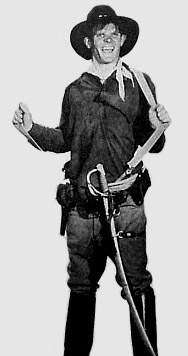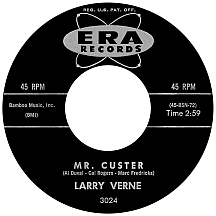LARRY VERNE
Mr. Custer
The Battle of Little Bighorn took place in Montana on June 25, 1876; U.S. Army troops of the 7th Cavalry were wiped out by overwhelming numbers of Lakota and Arapaho Indian warriors. Lieutenant Colonel George Armstrong Custer, who died with his troops, made several errors in judgment that led to the massacre. Throughout the years, singers and pop music composers have created songs about such occurrences that could be termed "Historical Hits," several of them popular in 1959 and 1960, a trend sparked by Johnny Horton's chart-topping smash "The Battle of New Orleans." Others include Stonewall Jackson's "Waterloo," which mentions Napoleon Bonaparte's legendary defeat, several songs by Marty Robbins about actual and fictional wild western events, and many more by Horton. "Comanche (The Brave Horse)," a track on the album Johnny Horton Makes History, references the conflict at Little Bighorn; according to the liner notes, the valiant steed "...was the sole survivor of all the forces in Custer's Last Stand." It's likely no one had the nerve to do a comedic take on the military tragedy...until a song you might cautiously call a "Hysterical Hit," "Mr. Custer" by Larry Verne, hit the airwaves in 1960.
Minneapolis-born Larry Verne Erickson moved to Los Angeles after a stint with the Marines and spent the latter half of the 1950s working various odd jobs. He played piano and guitar and was drawn to show business. Stunt work for TV series like Zorro, Circus Boy and Rin Tin Tin kept a steady paycheck coming, but he really had his sights on a music career. While working in a photography studio on Sunset Boulevard, he became acquainted with Fred Darian, Al DeLory and Joe Van Winkle, who recorded for Del-Fi as The Balladeers ("Roll Call Company 'J'") and had an office in the same building. They were throwing ideas around for a novelty song about Bighorn and Larry started putting in his two cents during breaks from his regular job. They thought his whiny "hillbilly" voice would be funny on the track and headed over to the Gold Star studio to give it a whirl. The Balladeers sang: 'That famous day in history the men of the 7th cavalry went riding on...and from the rear a voice was heard, a brave young man with a trembling word rang loud and clear...' and Larry hollered: 'What am I doin' here?' Much of it was ad-libbed and after about 18 hours they had a history-gone-haywire master tape running about four and a half minutes.

Del-Fi boss Bob Keane liked the song, but felt it would quickly wear thin after repeated plays. Funny, cartoonish, off-center and potentially offensive ('There's a redskin waitin' out there, fixin' to take my hair...a coward I've been called, 'cause I don't want to wind up dead or bald!'), they pitched it to all the major L.A. labels and finally found a taker in Herb Newman of the smaller Era Records; he had it edited to around three minutes before foisting it upon an unprepared public (first pressings carried songwriter pseudonyms due to a publishing conflict between BMI and ASCAP). "Okeefenokee Two Step," a two-left-feet parody of the "Madison Time" dance craze record that had been a hit a few months earlier for both Ray Bryant and Al Brown's Tunetoppers, gratingly graced the B side. The disrespectful accounting of Custer's Last Stand ('I wonder what the Injun word for friend is...hey out there, keem-o-sabe!' ...PHHHTT!!!...'No, that idn't it...') dropped in August '60, received airplay right away (Dick Clark of American Bandstand was an early supporter), listeners flipped their lids, the disc reached Billboard's top ten in just two weeks and in October ('Forward...ho!') it hit number one (holding Sam Cooke's "Chain Gang" at bay)!
Charlie Drake's cover of the track, basically placing a goofy British dude in the middle of the 84-year-old Montana battle, eclipsed Verne's original in the U.K. Back in Cali, Era put out Mister Larry Verne, an album consisting of mostly spoken comedy monologues and routines, some sticking to the title's theme ("Mister Nero," "Mistopher Columbus"). Follow-up 45 "Mister Livingston" made fun of Henry Stanley's historic 1871 trek through Darkest Africa in search of David Livingstone, altering the famous phrase everyone knows to 'Heyyy...Mister Livingston, I DO presume!' as he dodged local residents ('...are them fellas over there really cannibals?...Oh yeah?...Sorry, I can't stay for dinner!') and met a grisly, abrupt end in quicksand. This time Herb didn't bother to edit the nearly four minute track; it reached the top 40 on a number of radio stations but charted nationally for only a few weeks at the end of the year.
Another madcap dance tune, "Abdul's Party," maxed out the corny gags; unheard sidekick Charlie, who died by arrow in "Mr. Custer" and was swallowed whole by a man-eating plant in its jungle-set follow-up, was a character in this, and most, of Verne's recordings, including the fourth single, Casey of baseball poetry fame sendup "Charlie at the Bat." On "The Speck," Larry faced a one-eyed space creature. Silly variations on the wild west theme, "I'm a Brave Litle Soldier" and "The Coward That Won the West," appeared in '62 and "Return of Mr. Custer" marked the end of the madness at 1964. He left the label, opting from then on to leave the music-making to others. Larry Verne worked for the next three decades constructing sets for Hollywood movies, many of them featuring music scores by his old pal Al DeLory.


